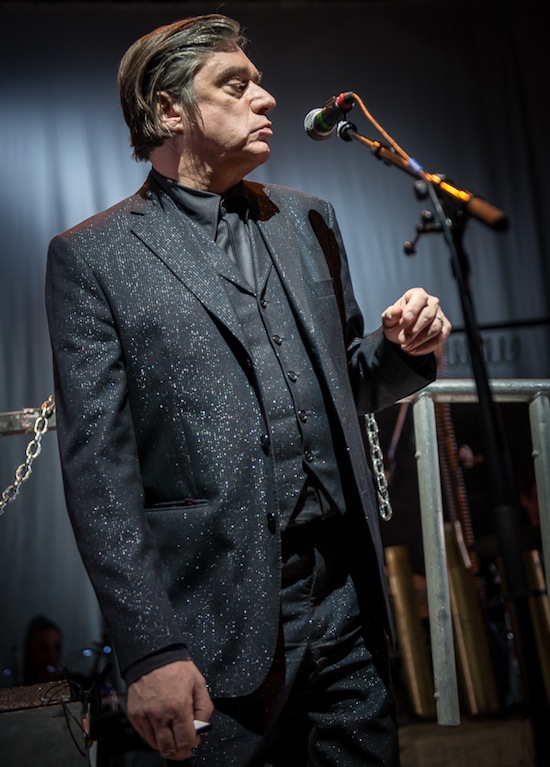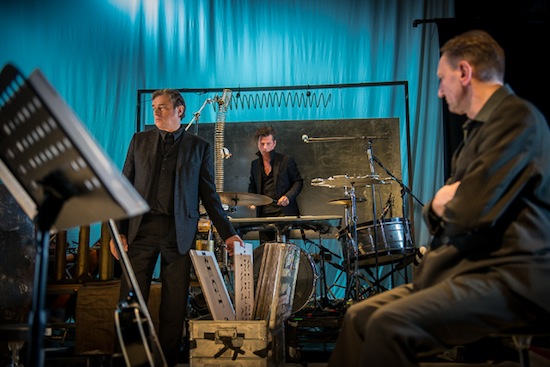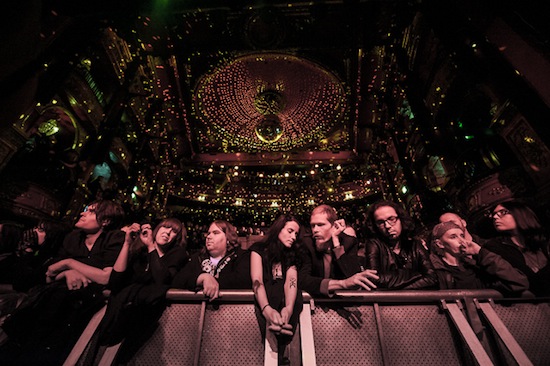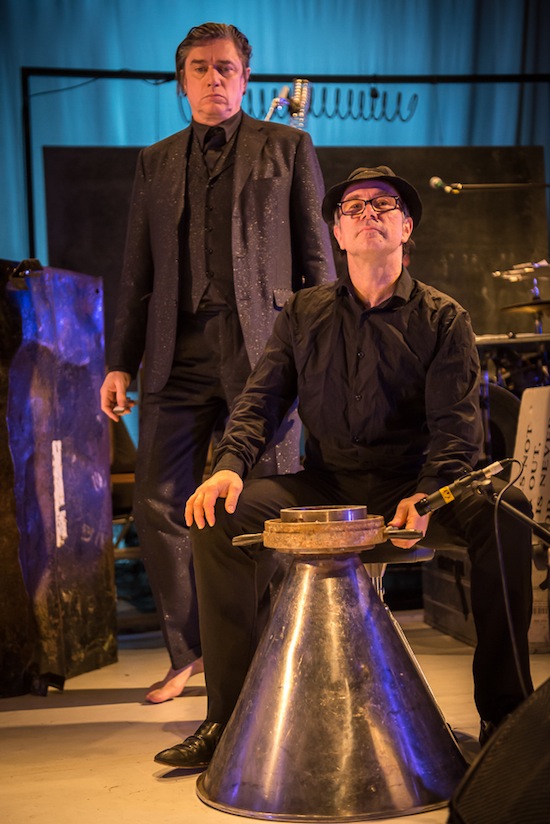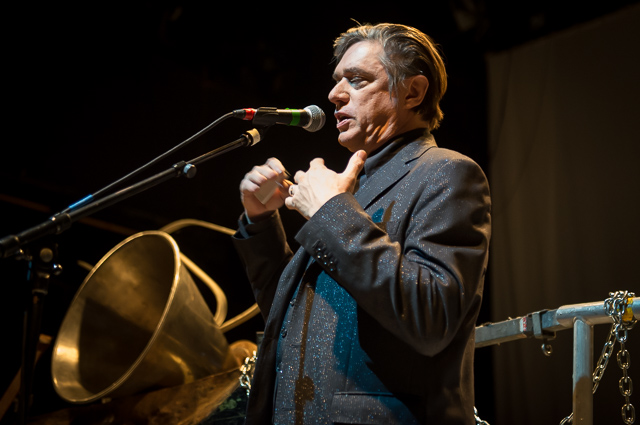Most bands write an album, then record it, then tour to support it. Einstürzende Neubauten, needless to say, are not most bands. Their latest effort, Lament is a pre-emptive documentation of a performance that hadn’t yet taken place, but which was conceived first and foremost as a live show. The band was commissioned by the Belgian region of Flanders to create a themed site-specific performance commemorating the 100th anniversary of World War I. As founder and lyricist Blixa Bargeld stresses in an interview that appears in the program for the concert, "The whole album is conceived as a performance…It has been written as a performance. It’s a piece of theatre."
The band debut their new long-form composition in the town of Diksmuide, the site of a battle in which Belgian forces turned nature itself into an implement of war and flooded the region to prevent the advance of German forces. In an odd but oddly apt twist, the Belgians commemorated this event by inviting a German band who first made their reputation harnessing chaos out of fire and metal. And now I’m standing in front of a stage laden with strange and familiar implements, wondering how this relentlessly exploratory band would bring history to life.
Einstürzende Neubauten are known for their unusual instrumentation. Though percussionist Andrew Unruh has stated repeatedly that he sold his drum kit and replaced it with metal and bricks because he was broke and needed the money, the concrete-ness of their musique quickly became both defining characteristic and guiding ethos, with the band embarking on a relentless quest to explore the sonic potential hidden in the scraps and shrapnel of Cold War Berlin, quickly adding metal, water, concrete, fire, found recordings, sand, bamboo, meat, and plastic to their auditory repertoire. Using power tools to hammer and scrape at steel springs and gears, they were the most industrial of nominally industrial bands by virtue not of an assembly-line ethos but by the nature of their materials. In keeping with this, the set-up for a live EN show will include any number of unusual implements. The set-up varies from tour to tour and often contains tour-specific elements that are never repeated; the set-up is also intimately linked to the setlist, because the instrumentation for a particular song must be available for that song to be performed.
The band take the stage along with a string quartet and the show begins with clinking chains and metal scraping against metal in a low squeal that might be grating if it didn’t feel like coming home. As the droning strings grow more frantic, Jochen Arbeit’s e-bowed guitar grows louder as layer upon layer of scrapes and groans are fused into a vivid cacophony of sound, reminiscent of such peak Neubauten moments as ‘Der Tod ist ein Dandy’ (1985) and ‘Prolog’ (1989), a frenzied assault on metal of the kind for which the EN were once notorious but which they’ve rarely exhibit in recent years. This track is ‘Kriegsmachinerie’ (war machine or apparatus of war), the opening number of the performance and of the album. As the noise grows and shimmers, Unruh and bassist Alexander Hacke pull together the old implements at the front of the stage, including the tanks and the angel wings and chains, and pile, slide, and screw them together into a strange assemblage; these metallic objects, already relics repurposed into instruments, now found themselves instruments repurposed to create a sculptural performance. This is more or less the essence of the evening, both in theme and in practice: old fragments, worn with age but still potent, revived and rendered worthy of rapt attention by recontextualisation and reorganisation.
Lament is, as noted, centrally preoccupied with the First World War. The product not just of a themed commission but of extensive archival research (as many cultural productions seem to be now that the historical turn has spread beyond the humanities and into the performing arts), the materials built into it include telegrams between the German Kaiser and the Russian Tsar on the eve of the war, two war poems in Flemish by a forgotten Dutch poet, the haunted and haunting voices of Allied soldiers in POW camps recorded onto wax cylinders by German linguists, and two cover versions by the obscure proto-jazz band The Harlem Hellfighters, a group whose active performances in Europe during the war included, Bargeld gleefully informs the audience, the legendary Mr. Bojangles as a dancer. The resulting product is not quite a narrative, not quite a concept album, and not quite performance art but a theatrical mélange of the three, filtered through Neubauten’s distinctive sensibility, which has always occupied a rarified sphere at the threshold of the punningly abstract and the absurdly literal (see, for example, the page-turning machine Unruh constructed for a staging of Faust by Werner Schwab). Thus the new instrumentation constructed for Lament include a "harp" of barbed wire and amplified crutches on which Alex Hacke laboriously thuds across the stage, deceptively nonchalant slapstick in perfect time. Hacke also takes over more vocal duties than he ever has before, duetting with Bargeld as the voice of the last Russian Tsar, "Nicki" (Nikolas I) on ‘The Willy-Nicki Telegrams’ and alternating with the rest of the band in chorus on the Hellfighters’ ‘On Patrol In No Man’s Land’, a growly turn through Americana that is unusual but not unprecedented in the German band’s back catalog, which includes covers of Lee Hazelwood and Tim Rose as well as the loping Tex-motorik thump of ‘What Love Does To Me’ (1999).
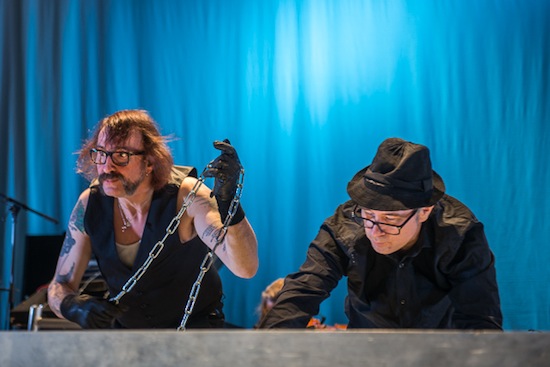
The performance is well-paced and well-rehearsed; a few brief squeals of feedback in the encores are the only noticeable technical difficulties. The found material folds harmoniously and effortlessly into the band’s own compositions and sonic twists to create an experiential trajectory that is coherent and affecting without being directly narrative, and, more importantly, without ever sinking into the kind of pathos or melodrama which a less masterful group of artists might deploy in dealing with this kind of material or with this kind of commission. The live show’s setlist is largely similar to the recorded album, slightly changing the order in a couple of places and adding two older songs in the encores (‘Let’s Do It A Dada’ and ‘Ich Gehe Jetzt’ as the final number). Moments of thudding intensity alternate with fragile silences and passages of haunting minimalism, as has long been Neubauten’s habit, but even the most delicate moments aren’t precious or naïve, mostly because the band have always leavened their intensity with a healthy dose of wry humour, even if, like Kafka and Nietzsche, Einstürzende Neubauten have frequently suffered the unfortunate fate of having their humour lost in translation to the Anglo-American sphere. So if it’s hard to imagine a commemoration of European war without reference to European nationalism, Neubauten avoid the treacle-y allure of patriotism by turning the second number, ‘Hymnen’, into a mashup of pre-WWI national anthems, exposing in tandem the joint melodic source of English, German, and French national pride and the fundamental irony of a pride in national individuation. And when Bargeld comes out to sing Marlene Dietrich’s German version of Pete Seeger’s ‘Where Have All the Flowers Gone’, he does so wrapped in a deconstructed paper recreation of Dietrich’s white feather dress.
This isn’t Dietrich’s first appearance in Neubauten’s mythography. She also haunts the lyrics of ‘Die Befindlichkeit des Landes’, (2000) in which Bargeld marks the ironic fact that the shiny new plaza at the center of the Potsdamer Platz shopping area was named "Marlene-Dietrich-Platz," when native Berliners protested Dietrich’s internment in Berlin after her death with cries of "Marlene go home!" due to her staunch anti-fascist stance during World War II. Bargeld’s deft imagery blurs Dietrich’s ghost with Walter Benjamin’s Angel of History, who in a famous essay stands facing the future with the past piling up behind her. The song makes clear Bargeld’s opinion of those who paper over the unpleasant details of history in the interest of producing a happy unified façade. Neubauten themselves, on the other hand, have always been keenly attuned to the vicissitudes and complications of German and European cultural history, down to their very name (Neubauten or "new buildings" is a legal term in Germany which refers to buildings constructed after the end of World War II); they have always insistently put the grim reality of this history front and center in their work, and constructed their instrumentation out of its gritty residue. The same historicizing consciousness which has been the source of their sonic palette has been the source of their resolute anti-fascism (in their chaotic individuation as band members no less than in songs like ‘Die Genaue Zeit’, ‘Kein Bestandteil Sein’, and ‘Headcleaner’, down to their refusal to use Neumann microphones, an industry standard which also happens to have been beloved of Third Reich propagandists).
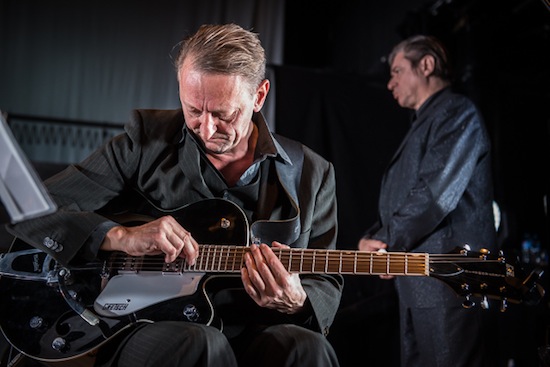
If Einstürzende Neubauten disdain those who paper over the unpleasant details of history in the interest of producing a happy unified façade, it is because they have always done exactly the opposite. In the face of a cultural ideology which encourages us to sweep aside the broken and old in favor of the shiny and new, Neubauten have made a career out of collecting and repurposing the fragments and shards of history and constructing from them a cacophonous and absolutely distinctive bricolage. If Lament, as Bargeld suggested in a recent interview, is less a radical departure than a performative deployment of familiar strategies, this is because both thematically and technically, it represents an entirely logical next step for a band that has always been obsessed with history no less than with found materials. In their choice of material – both thematically and physically – EN have always been about diving back into the rubble of the past to discover something new and beautiful. Lament, both album and performance, is no exception.
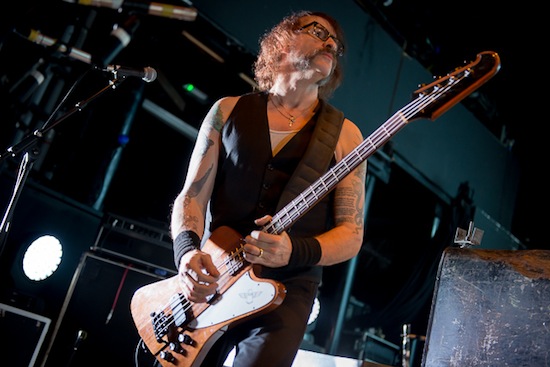
What is less evident, perhaps, is the degree to which the past they mine for resources is not only European and German history in general but their own history as a band. This is clear in the sculptural reconstruction to which their old implements are subjected during ‘Kriegsmachinerie’, but also more subtly present elsewhere. As Bargeld insists, Lament is more about repurposing than about radical reinvention, and this refers not only to the band’s constructed instruments but to their techniques and distinctive auditory repertoire. Over the three-and-a-half decades of their existence, Neubauten have not only accumulated an arsenal of unusual materials but also developed array of distinctive techniques for working with those materials and turning their sonic potential into music. While a casual listener might find these techniques entirely new on first exposure, an experienced eye can spot in Lament a number of what are essentially musical self-quotations.
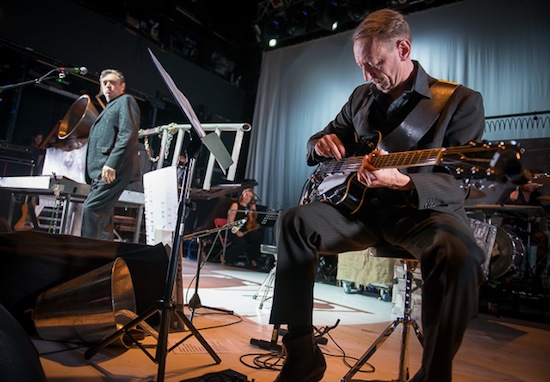
Take the chorus of looped wordless vocals that forms the reverb-drenched sonic bed of the album’s three-part title track. Bargeld has been using looping pedals for his vocals for years; they are the only implement on-stage during his solo performance series Rede/Speech. But here that looping practice is extended to the entire band, each member humming in his microphone while long-time accomplice and front-of-house engineer Boris Wilsdorf loops and meshes the sounds into a deep web of vocal drones; the technique is deployed in ‘Lament’ in a virtually identical manner to the way it was used in 2005’s epic, 25-minute composition ‘Grundstueck’. Another example are the air compressors and grey plastic pipes used at multiple points in the show. The air compressor first appeared in 1997, in the intro to the title track from Ende Neu, and in 2003, during studio sessions for what would become Supporter Album No. 1, the air compressors multiplied and were blown by hand down long grey pipes, turning them into a crude horizontal pipe organ, displayed to greatest effect on that album’s opener, ‘Ich Gehe Jetzt’, which reappears on the Lament tour as the closing song, after nearly a decade off the Neubauten setlist. Meanwhile on Lament’s ‘Achterland’, a row of nozzles hiss out compressed air to conjure the gas with which soldiers were sprayed to de-louse them during the war. On Lament‘s longest and most conceptually elaborate track, the 13-minute ‘The 1st World War (Percussion Version)’, Moser, Hacke, and Unruh all pound out a complex and hypnotic polyrhythm on not four but 12 grey pipes, each beat of the 4/4 meter representing a single day in the war and each one of the pipes representing one of the major players in the conflagration. It’s not just that Neubauten quote themselves; it’s that the band has their own special sonic vocabulary, in which individual elements, once they enter the language, become available for geometrically-expanding new iterations of form and meaning.
There are hints of this process throughout Lament and the accompanying live show, but it’s not until the vibrant climax of the main set’s final number that this self-referentiality bursts to the forefront. ‘How Did I Die?’ begins with a stately, precise march, Unruh keeping time with the pipes and the air compressors as Bargeld intones the title’s question. Alternately in English, French, and German, he describes what might be a post-mortem effort at remembering by the ghost of a fallen soldier ("I fell into a ditch…How did I die? Or didn’t I die at all?"). But as the tremulous strings grow in volume and the languid pace turns into an exquisitely growing tension, the lyrics shift unexpectedly from singular to plural and the subject could just as easily be Neubauten themselves: "We didn’t die! We didn’t die! We are back with a different song…ein anderer Wind, ein neues Lied [another wind, a new song]."
In 1996, Einstürzende Neubauten nearly broke up permanently when two founding members left, Marc Chung just prior to and F.M. Einheit during the recording of their seventh studio album. That album became 1997’s Ende Neu, a change of direction and a new beginning for the band. Bargeld’s lyrics have always been intensely self-reflexive, and often focused on the band’s creative integrity and their relation to the world of consumer culture, but this reflection took on a new urgency and insistent vigor in the lyrics of Ende Neu‘s title track, in which he references the phoenix, self-immolating as the condition of its own rebirth, and sings "Close the door, we’ll keep on dancing." All the albums since then have included intense meditations on the nature of the past and its relation to the present as it unfolds into the future, whether ‘Die Befindlichkeit des Landes’ on Silence Is Sexy, ‘Dead Friends (Around the Corner)’ on Perpetuum Mobile, or the haunting ‘Susej’ from 2008’s Alles Wieder Offen, in which, over a low-fi sample of Bargeld playing the guitar in his early 20s, rescued from an EN rehearsal tape predating their first album, he imagines a dialogue between his current self and his former self ("My old self and my young self, or my old self and my new self," as he was fond of prefacing the song during live performances of it in 2008 and 2010). The phrase "ein neues Lied," meanwhile, "a new song," appears in the refrain from 2004’s ‘Ein Seltener Vogel’, the centerpiece of Perpetuum Mobile, which imagines a flood wiping out all species of bird but one, a "rare bird" which flies to the top of the Biblical Mount Ararat and returns with "a new song" in its beak.
This particular form of inventive self-quotation has long been a hallmark of Neubauten’s performance strategy and a central aspect of the band’s compositional approach. The thing is, Einstürzende Neubauten have always been first and foremost a live band. This might seem an odd statement to make about a band that tours so sporadically, and whose recorded body of work consists of elaborate, meticulously crafted and often highly conceptual albums composed with densely multi-tracked vocals and such sounds as fire, sliding gravel, and the sampled hum of 40,000-volt electric cables. But it is nonetheless a true statement, as anyone will affirm who has witnessed them at any point in its now-34-year career trajectory. The albums are incredible, ground-breaking, complex; live, that meticulous complexity becomes an incendiary, transcendent experience. Seeing Einstürzende Neubauten live is a visceral, gob-smacking reminder of the distinctive value that materiality, presence, and the history of objects have in three dimensions.
Neubauten’s history is not a history of discrete events and clearly marked boundaries, it’s a history of continuous, endless iterative processes, ruptures, and punctuated equilibrium that alternates quiet with crisis. During Lament‘s opening number, as the rest of the band create a growing wall of sound and build the war-machine sculpture at the front of the stage, Bargeld doesn’t speak or sing but rather walks around the stage holding a series of placards above his head. "War does not break out, it is never caught or chained" reads the first one; "building itself up slowly, in movements believed forgotten," reads another; and "it regains its old strengths from debilitating disappointments." Find/replace war with "Neubauten’s music" and you effectively have not just a nutshell of the band’s biography but a précis of their working methods, as well. Lament, for all its distinctive origin and thematic quirks, is on closer reflection entirely of a piece with EN’s remarkable canon of relentless and relentlessly historicizing recreation, an ongoing musical saga whose reach continues to extend both further and further into the past and increasingly far into the future.
